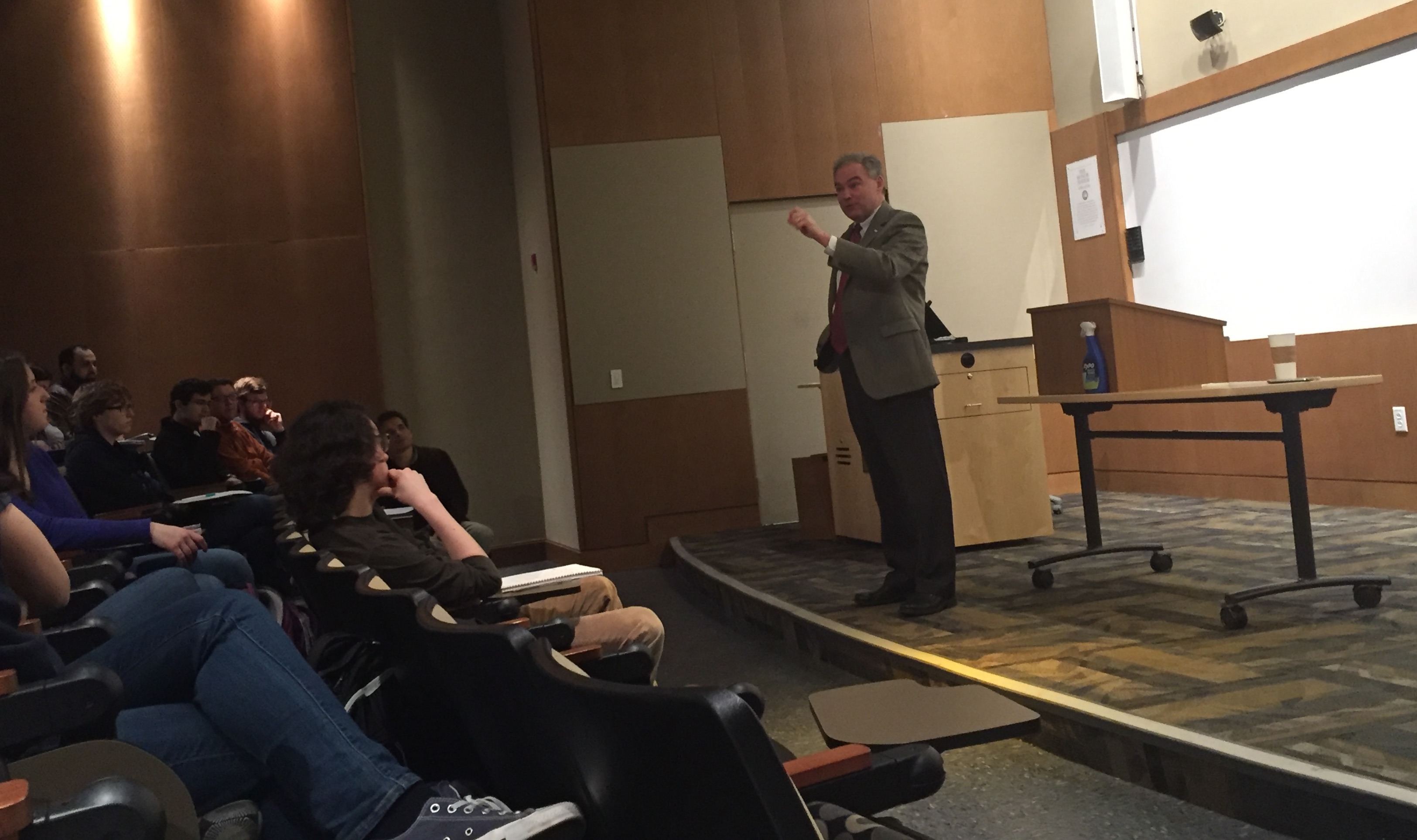Sen. Tim Kaine visits UMW’s political science class
3 min read
David Concepcion | The Blue & Gray Press
By DAVID CONCEPCION
On Monday, Virginia Senator Tim Kaine spoke in front of professor Ranjit Singh’s Intro to Political Science class. Tim Kaine brought up topics ranging from his personal ambitions to foreign policy.
To political science and international affairs professor Singh, the talk by Senator Tim Kaine gives his students insights about how he lives a regular life and sees how his political ideologies formed. The course gives students an introduction to political culture and ideologies by bringing in someone who’s in politics to speak.
“Tim Kaine is a real person,” Singh said. “He’s a real politician, he is the embodiment of political activism and engagement in politics, which is why I think that it’s important he explained why he became involved in politics.”
According to Kaine, he and his staff were spending the day UMW, meeting at the University Center after Kaine spoke with the class.
Kaine grew up in Kansas and explained the irony of how he was a democrat and getting involved in politics, as his family did not talk about politics. When Kaine was 17, he registered as a Democrat when he found out his parents were Republicans.
Before Kaine was elected as Senator of Virginia, he had a long history of political engagement in the state. He previously served on the Richmond City Council after working for civil rights groups. After, Kaine served as the Mayor of Richmond, Lieutenant Governor of Virginia and Governor of Virginia. After being Governor of Virginia, Kaine became chosen as the Chair of the Democratic National Committee.
Kaine mentioned the possibility of how presidential candidates would visit UMW in this upcoming year due to shifts in political views. Virginia has become increasingly more important in the presidential election as it has shifted from a reliably Republican state to a swing state. Kaine saw this transition when he was first elected Lieutenant Governor beating out running mate, Mark Warner.
“It wasn’t until 2012, after Obama won in 08’, that both parties really competed hard for Virginia,” Kaine said. “Because they both realized this was a battleground state.” After talking about his personal history, Kaine opened up questions to the room full of students.
The first question asked was about superdelegates and how they could influence an election. Superdelegates are people that attend their respective party conventions and vote for whoever they want as their party’s nominee. It is seen as controversial because this could allow Hillary Clinton to be the Democratic nominee despite Bernie Sanders getting the popular vote.
“Young people are seeing that superdelegates are overwhelmingly voting for Hillary Clinton,” said senior political science major John Bownik. “How can you convince young people that their vote counts in primary?”
Kaine, despite being a Hillary Clinton supporter, is in favor of removing superdelegates and touted his record trying to advocate for removing superdelegates as Chairman of the Democratic National Committee.
“As a Democrat, I believe that the superdelegate is undemocratic,” Kaine said. Kaine gave his input on Republicans blocking any future Supreme Court Nomination given by President Obama, believing the decision to block the nomination as unjust. Kaine was then asked about the United States’ controversial support for Saudi Arabia.
The country is known to have face many accusations of human rights violations such as many executions and inequality between men and women.
Kaine answered by saying while there is an alliance between the United States and Saudi Arabia, the relationship has been deteriorating as the Obama administration has lashed out against its human rights violations. The lack of need for Saudi oil also has been a huge factor, as the United States is now a net-exporter of crude oil.
Kaine concluded his talk as the 50-minute mark approached.
“This is someone who is in the news and really relevant,” Singh said. “We’re really lucky to have him.”


